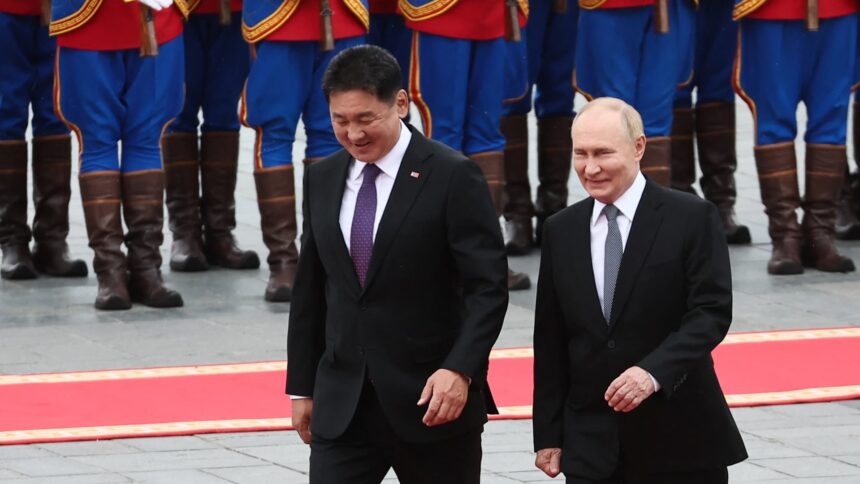In this pool photo distributed by Russian state agency Sputnik, Russian President Vladimir Putin and Mongolian President Ukhnaagiin Khurelsukh walk past a guard of honor during an official welcome ceremony in Ulaanbaatar on September 3, 2024.
Sofia Sandurskaya Afp | Getty Images
There is nothing surprising about Russian President Vladimir Putin’s visit to Mongolia on Tuesday – he will meet with the country’s leaders, talk about developing bilateral relations and attend a gala reception.
Unusually, Mongolia, as a member of the International Criminal Court (ICC), is expected to arrest the Russian president as soon as he lands on Mongolian soil Monday evening.
Putin is the subject of an international arrest warrant issued by the ICC in March 2023. The court found him responsible for war crimes, with a particular focus on the illegal deportation of children from Ukraine to Russia.
At the time, the Kremlin described the ICC’s actions as “outrageous and unacceptable” and said they had no influence on Russia, which is not a member of the ICC.
Mongolia is now in hot water as Putin visits the country – his first visit to an ICC member state since the arrest warrant was issued – with apparent impunity.
According to the Rome Statute, the ICC’s founding treaty that began in 2002, ICC member states are required to detain and hand over to the court anyone subject to an ICC arrest warrant, if they step foot on the ground.
The court had no way of enforcing the rule, and Mongolia protested by welcoming Putin with dignity when he met with President Ukhnaagiin Khurelsukh in the capital, Ulaanbaatar, on Tuesday.
In this pool photo distributed by Russian state agency Sputnik, Russian President Vladimir Putin and Mongolian President Ukhnaagiin Khurelsukh walk past a guard of honor during an official welcome ceremony in Ulaanbaatar on September 3, 2024.
Sofia Sandurskaya Afp | Getty Images
Mongolia’s risky move has caused confusion in the ICC, which is based in the Netherlands, and in Ukraine, which Russia invaded in February 2022.
The ICC spokesman, Fadi el-Abdallah, told the BBC last Friday that Mongolia had an “obligation” to comply with the arrest warrant and said that “if there is no cooperation, the ICC judges can make findings to that effect and inform the Assembly of States Parties it is then for the Assembly to take whatever steps it deems appropriate.
He did not specify any measures that could be taken, and clarified that the ICC allows some exceptions to the rule, such as when a state can be forced to “breach a treaty obligation” with another state or where it would violate “diplomatic immunity of persons or property of the state third,” said the BBC report.
International legal experts warned Monday that Mongolia’s failure to meet its obligations to the ICC would have consequences, and some considered possible prosecution.
“ICC States parties should not invite people subject to ICC arrest warrants to visit their countries for any reason. Stop,” said Mark Ellis, executive director of the International Bar Association (IBA), the organization that represents the global legal profession.
“Mongolia’s membership in the ICC and respect for the rule of law demand that they comply with this arrest warrant or let President Putin know that he is not welcome in Mongolia. This is the moment when Mongolia, as a State Party, must apply the law to politics,“ said in an email comment on Friday.
Russian President Vladimir Putin enters the hall during a meeting with ministers at the Novo-Ogaryovo State Residence on August 7, 2024, in Moscow, Russia. This week Putin called on Iran to limit the damage to any relations with Israel.
Contributor | Getty Images News | Getty Images
The IBA continued to warn that Mongolia, a member of the ICC since 2002, could face “consequences for non-cooperation.” While not specifying what this is, there is speculation that Mongolia may now be prosecuted by the ICC.
Mongolia has yet to comment or respond to criticism of Putin’s trip. CNBC has contacted the country’s foreign minister for comment.
Russia mocks the ICC
Russia is confident about the trip to Ulaanbaatar ahead of time, with no worries about a potential detention scenario in a country where Moscow aims to increase its regional influence and energy infrastructure.
Kremlin spokesman Dmitry Peskov told reporters last Friday that the Kremlin was “not worried” about the trip, noting that the Russian leader had “a very good dialogue with our friends from Mongolia.”
Russian media agency TASS quoted Russian Presidential Aide Yury Ushakov as saying that the two leaders will discuss cooperation between Moscow and Ulaanbaatar “in industrial production, agriculture and railway transport” as well as educational and exchange programs.
Democracy Fellow with the Center for European Policy Analysis, Elena Davlikanova, said that Russia used the trip to “mock the ICC,” with the country’s economic infiltration as a deliberate choice for the visit to test the ICC’s mettle.
“Of course, Putin will not travel if there is a possibility of arrest. The country has assured Moscow that the president will not be arrested,” he noted in his analysis on Friday.
“Sandwiched between two powerful neighbors, Russia and China, Mongolia has long been limited in its freedom of maneuver, so Putin’s choice makes cruel sense,” he added.
A pickup truck with the Ukrainian army in the back moves to the border with Russia on August 16, 2024 in Sumy Oblast, Ukraine. The fighting in Kursk Oblast began on August 6, 2024, when the Ukrainian Armed Forces crossed the Russian-Ukrainian border near the city of Sudzha and began to advance into Russian territory, and in a few days took control of dozens of settlements. in the Kursk region.
Global Image of Ukraine | Global Image of Ukraine | Getty Images
For Russia, the trip was not only a distraction from Ukraine’s attack on the Kursk border region, but also a way to “help maintain Putin’s image as a strong leader at home and abroad,” he said, adding that the trip also helped destabilize the situation mentioned. The ICC and the prospect of future prosecutions of suspected war crimes.
“Putin is willing to violate the norms of international law to undermine international law. Hungary and Armenia, as well as members of the ICC, have assured the president that he will not be arrested on the ground, further undermining the effectiveness of the court. If the world order continues to weaken. the prospect for a trial for Russian war criminals , reparations and accountability will be significantly reduced, undermining Ukraine’s hope for a just peace,” Davlikanova said.
Consternation in Ukraine, Europe
The spokesman of the Ministry of Foreign Affairs of Ukraine, Heorhiy Tykhyi, said in Telegram on Monday that “Mongolia has allowed the accused criminals to avoid justice, therefore it is responsible for war crimes.” He added that Kyiv will work with its partners “to ensure that this has consequences for Ulaanbaatar.”
The European Commission on Monday called on Mongolia to fulfill its obligations to the ICC.
“Mongolia, like all other countries, has the right to develop international relations according to its own interests, but … Mongolia has been a state party to the Rome Statute of the ICC since 2002 with existing legal obligations. through the delegation in Mongolia,” Commission spokesperson Nabila Massrali said Monday.
Human rights campaigners have also criticized the move with Human Rights Watch and Amnesty International among the groups calling for Mongolia to arrest Putin.
Altantuya Batdorj, executive director of Amnesty International Mongolia, commented Monday that “Mongolia’s international legal obligations are clear.”
“President Putin is a fugitive from justice. Any trip to an ICC member state that does not end arrests will encourage President Putin’s current actions and should be seen as part of a strategic effort to undermine the work of the ICC to prosecute suspected war criminals,” said Batdorj, in comments posted online.




